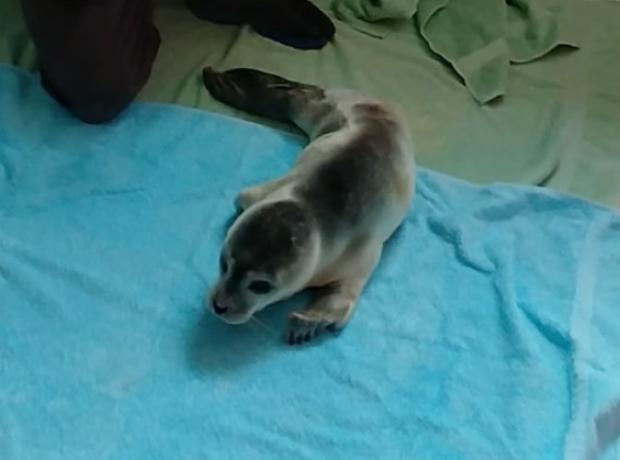Links to vets in Guernsey
Local useful links
Website donated by:

Yesterday GSPCA Ambulance Officer and Head of Marine Mammals Geoff George was called out to rescue and help a very poorly marine mammal at Chouet.
Only weeks after releasing Temperance the Grey Seal Pup back to the wild we now have a Common Seal Pup in our intensive care room for sick and injured seal pups.
Common Seals are extremely rare in Guernsey waters and to see a pup is even more so unusual, which certainly helps explain the condition of this very poorly pup.
At only 7.2kg and at only a couple of weeks of age ‘Seal’ as the Common Seal Pup has been named is having around the clock care and all at the Shelter are very worried about the condition of the very poorly seal pup.
Geoff George GSPCA Ambulance Officer and Head of Marine Mammals said “I was called out yesterday to rescue Seal the Common Seal Pup from Chouet.”
“At only 7.2 kg and the fact we don’t have a resident Common Seal Pup population we are all very worried for Seal.”
Steve Byrne GSPCA Manager said “We have helped a few Common Seal Pups in recent years but when they are found they have been so sick and injured we have been unable to help them back to the wild and we are all extremely worried for Seal as the pups condition is extremely weak.”
“We have a healthy population of Grey Seal Pups around Guernsey and it was a joy to see Temperance released back to the wild recently, but with Common Seals rare in our waters and not knowing how the Pup made it to Chouet and the poorly condition of the Pup we are having do care for Seal around the clock to do all we can.”
“Seal is being cared for in our seal intensive care room and although fit for purpose and provides what is needed it is in a building that is decades old and extremely expensive to maintain so this week we launched the plans for a new Wildlife Hospital with DLM Architects to give wild animals like Seal a facility that is fit for purpose for many decades to come and much larger pools for seal and sea birds rehabilitation.”
“We are appealing for support with our new Wildlife Hospital and have recently launched our Exclusive Build Partner scheme which is a way individuals or businesses can be part of this exciting project that will help the 1500-2000 wild animals and birds through the GSPCA doors every year.”
“We are doing everything we can for Seal and will of course keep everyone up to date on progress.”
For advice on what to do if you find a sick or injured seal pup please call us 24/7 on 01481 257261 or visit our helpful webpage - http://www.gspca.org.gg/animal/seal-advice
To donate to the animals in our care please visit - www.paypal.me/DonateGSPCA
To become an Angel Pen Pal Sponsor to sponsor the hoglets and support our work please visit - http://www.gspca.org.gg/about/angel-sponsorship-scheme-animals-needing-guernseys-everlasting-love
To learn more and become an Exclusive Build Partner and support our Wildlife Hospital please visit http://www.gspca.org.gg/page/gspca-exclusive-build-partner
The Common Seal or Harbour Seal, is a true seal of the Northern Hemisphere.
Having the widest range of all pinnipeds, Common Seals are found in coastal waters of the northern Atlantic and Pacific Oceans as well as those of the Baltic and North Seas.
There are an estimated 400,000 to 500,000 individuals living around our oceans worldwide and has a population that is not threatened as a whole. Common Seals inhabit the waters of the north Atlantic and north Pacific Oceans.
Common or Harbour Seal Facts
If you would like to help at one of our upcoming events or book a table at our Ball please give Michelle a call on 257261 or email [email protected]
For more information on volunteering at the GSPCA and how to get involved please visit http://gspca.org.gg/about/volunteers or call 257261
If your business or group would like to spend a day at the Shelter you can find out more by going to http://www.gspca.org.gg/about/corporate-and-group-days
To see the opening hours at the GSPCA please visit – http://www.gspca.org.gg/page/gspca-opening-visiting-times
To see our upcoming guided tours please visit - http://www.gspca.org.gg/services/guided-tours-gspca
To see our Wish List on our website please visit - http://www.gspca.org.gg/about/our-plans-wish-list
For other fund raising ideas and ways to support please visit - http://www.gspca.org.gg/fundraising
To visit the details on the Urgent Kennel Floor Appeal please visit - www.gspca.org.gg/blog/urgent-kennel-floor-appeal-%E2%80%93-kennel-flooring-work-discovers-need-new-drains-and-completely-ripp
To find out how your business could help us at the GSPCA http://www.gspca.org.gg/about/how-your-business-can-help-gspca-corporate-sponsorship



Post new comment
More information about formatting options